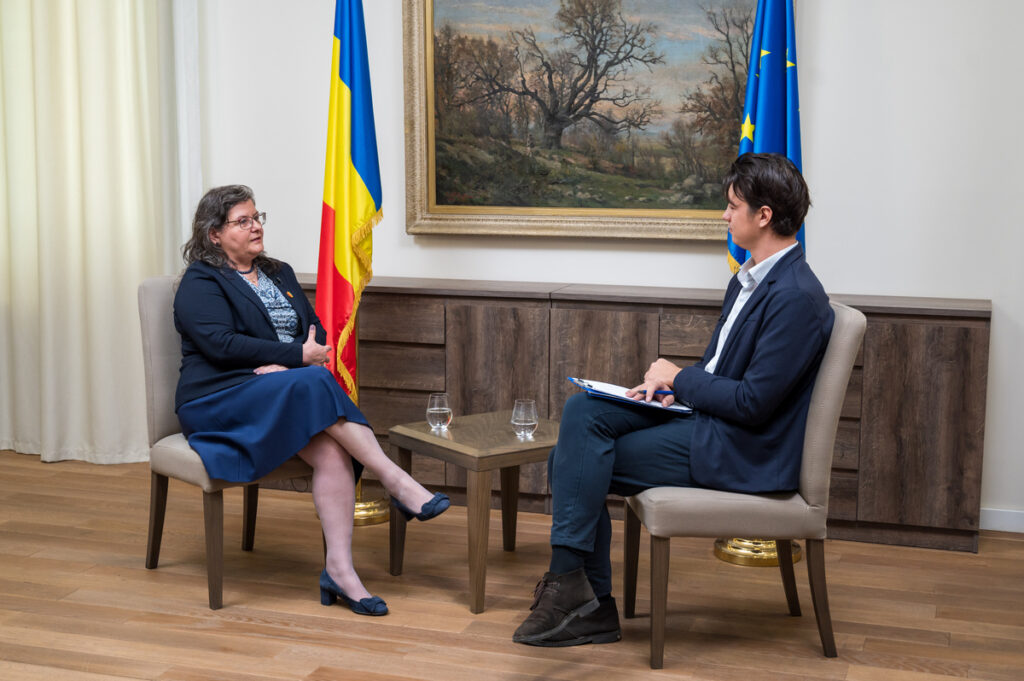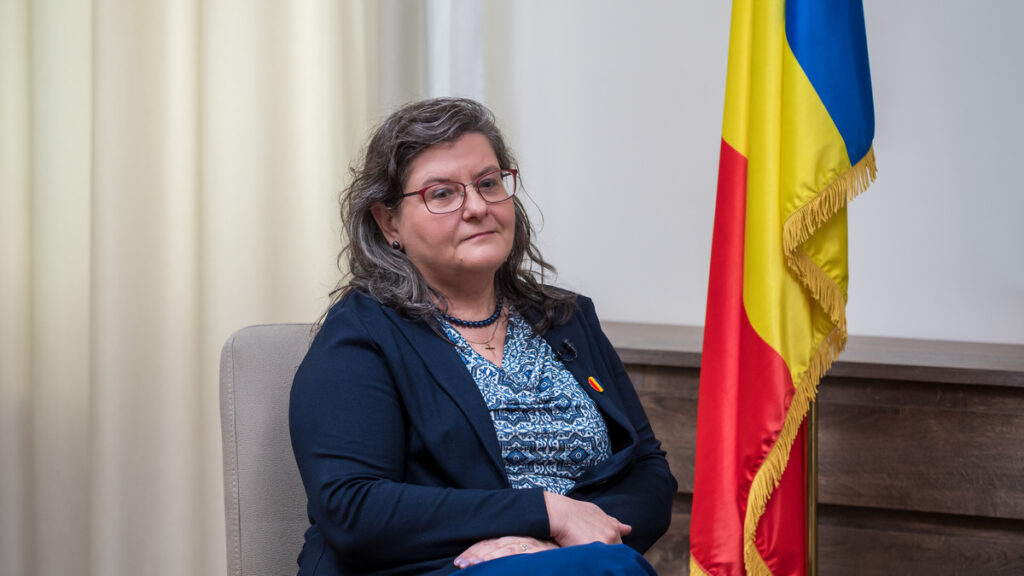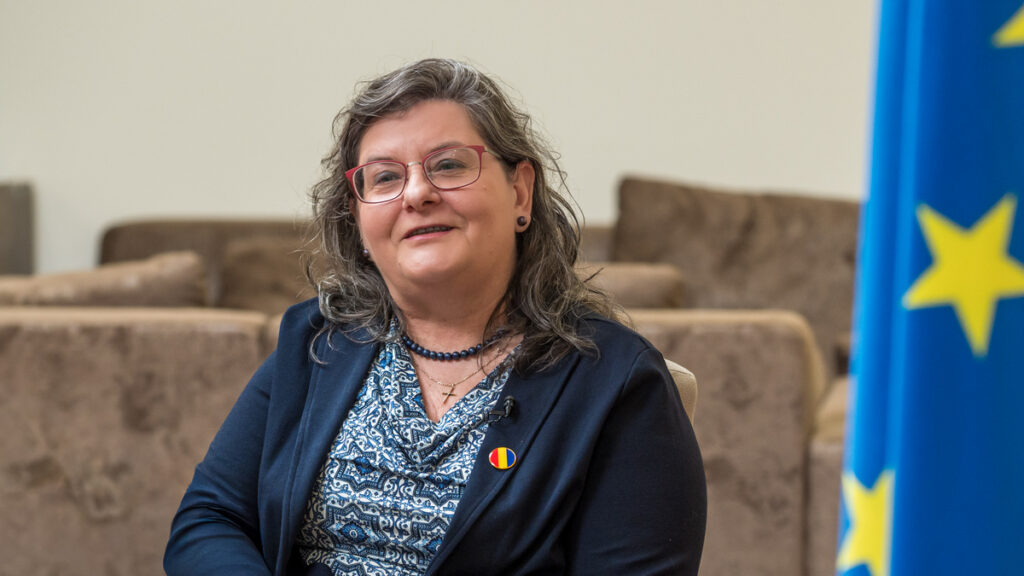How partnership, dialogue and people-to-people ties shape tomorrow’s diplomacy

AMBASSADOR’S INTERVIEW
by Mijat Kontić
H.E. Silvia Davidoiu
Ambassador of Romania to Serbia
This interview with H.E. Silvia Davidoiu, Ambassador of Romania to Serbia, is the transcript of her conversation for Diplomata, a programme produced by Diplomacy & Commerce in partnership with Euronews Serbia. She reflects on the evolving role of diplomacy, regional stability and the importance of deep, people-centred cooperation.
International relations evolve faster than ever
Throughout your career, you have witnessed diplomacy evolve across borders and over time. What does it mean to be an ambassador in 2025?
Yes, this is my third ambassadorial post, and I can say there is a huge difference between today and the past, not only compared to when I was an ambassador before, but even earlier as a diplomat. International relations have evolved, and our work has evolved as well — it has become more complex, more sensitive and requires much more from us than before. The environment is completely different, and the challenges are many. It changes every day. Things that were once normal two years ago are no longer so, and society itself has become more demanding. People expect diplomats to act differently, to be more decisive, to defend their rights, and to demonstrate that we are active and protecting their interests. Things are more complicated because we must also be present on social media. Diplomacy is no longer what it once was, conducted behind closed doors in quiet rooms. We must be visible and vocal, because people expect to see how we do our job and that we deliver what they expect from us.

At the 2025 Munich Security Conference, Serbia and Romania reaffirmed their commitment to preserving their traditional friendship. What does that phrase mean in modern diplomacy today?
I think that moment — it was in February this year — is just a drop in the ocean of our long-standing bilateral relations. I believe the ministers met in Munich, but we have a series of meetings at ministerial and other levels that are ongoing. Perhaps not as many as we would like, but still, I think we have a stable friendship. Like any friendship, it grows and must be nurtured, but we are on a very good path. It is a traditional friendship, and many officials highlight it. I truly believe we have a stable, solid relationship that goes beyond formal meetings and reaches very deep, deeply rooted in the connection between our peoples. We are neighbours; we have always been very good neighbours. One point is always emphasised — that our two countries, in this very troubled region, have never gone to war against each other. So it is a very special relationship.
Our relationship is deeply rooted in the connection between our peoples
What cross-border initiatives between Romania and Serbia, or possible regional partnerships by the end of 2025 or further in the future, would you like to highlight?
First of all, I want to say that I am very proud that the Romanian-Serbian cross-border IPA-CBC, and Interreg is one of the most successful interregional programmes at the EU level.
What will be the priorities of the Romanian Embassy in its cooperation with Serbia?
There is a long list of issues that are priorities for us. First, we would like stronger connectivity between us in terms of infrastructure. I think this is a priority for both sides. We want our motorway project between Timișoara and Pančevo to start taking concrete shape. It is currently on a very good track. We would also like rail connectivity to resume. We made a pause, but I think this will become a reality very soon.
I believe we share many interests in energy projects, which are crucial for both parties. Beyond these more prosaic matters, the most important element is our human connection — people-to-people ties, the fact that we have communities and minorities on both sides of the border and that everything functions smoothly. People come together in various formats and at different moments; they share many things, which creates a good framework for developing these contacts and relationships.
We will likely discuss EU-funded cross-border projects and programmes, which are essential for our bilateral cooperation and highly significant. The European Commission has recognised that we are doing very well in this field. We deliver results, and that carries special significance, as it demonstrates that both countries are committed to European values, cooperation, and bringing tangible benefits to our minorities in terms of economic development, education, environmental protection, and other aspects of daily life.
It is a good and efficient programme. It has grown in scale and funding over the past 12 years, and yesterday in Timișoara was a very special day: the Day of Romanian-Serbian Cooperation. We celebrated 35 years of the programme at the EU level and our very special cooperation by awarding the best projects implemented in recent years. It was impressive to see not only officials but also a hall full of representatives of local authorities, schools, hospitals, tourism agencies, as well as beneficiaries and implementers of these projects.

Since you mentioned the European family in your earlier answer, how does Romania view Serbia’s EU accession process, and what role does Romania see for itself?
I believe we have consistently supported Serbia’s EU accession and its efforts toward membership. It is not an easy path, and we know this from our own experience. It requires a great deal of effort, sacrifice and compromise, and overall it is a demanding process. But one thing I want to emphasise is that, in the end, the effort, compromise and sacrifice pay off. The benefits for the people are visible. Romania has experienced the full transformative power of EU membership over the past 18 years. We have now reached our maturity within the EU, and I truly cannot imagine my country outside it.
I do not see Serbia as a country outside the EU. Serbia belongs in the Union, and I am convinced of that. During my years in Serbia, I have come to understand that deep down every citizen here knows they belong to the European family. It ultimately comes down to uniting efforts, strength, and political will, and taking decisive steps toward full membership.
Effort, compromise and sacrifice always pay off
Another “family” we must mention, alongside the European Union, is of course the NATO Alliance, of which Romania is a member. How does Romania balance its NATO obligations with preserving regional stability in areas such as the Western Balkans?
I don’t think there is any contradiction between the two things you mentioned. They are completely compatible, and Romania has demonstrated — both politically and through its presence in the region — that it is strongly committed to maintaining peace and stability here. We are aware of all security risks. We cannot forget that a war is being fought on our border. You are somewhat farther from it, but even so, the global atmosphere is far from calm.
Romania encourages political dialogue bilaterally, as well as within NATO’s institutional framework with Serbia. Furthermore, we make steady contributions to the stability and security of this region through our presence in KFOR — we have been there from the very beginning — and since 2023, we have further increased our presence. We now have around 180 soldiers on the ground, which is a significant contribution. We are also more strongly represented in EUFOR ALTHEA, where this year we are part of the command structure, and we currently have 700 personnel deployed there. So this is truly a substantial contribution. And we do it conscientiously, knowing that preserving peace and stability in this region is worth every effort.
This year, trade between the two countries has exceeded € 2 billion. Which sectors are driving that growth and supporting this positive trend?
I think we will reach two billion in just the first six months of this year. I look forward to the end of the year, when we will see the final figures. However, in recent years, we have recorded steady growth. I believe the potential is enormous. We can do much better, and we can do more. We have many areas that are traditional fields of economic cooperation between our two countries.
Firstly, the energy sector is one of the primary drivers of trade and economic exchange. We offer a range of agricultural products, as well as electronic and electrical engineering products, which are a significant part of our trade. However, I am pleased to see the results of our efforts in recent years to encourage cooperation in IT, telecommunications, and innovation, where we have invested significant effort in connecting institutions from both countries to create a more institutional framework for future cooperation. This is important at a time when services, particularly the IT sector, are engines of economic development. And I believe both sides have much to offer.
I want to highlight one more aspect of our economic cooperation, which, once again, relates to the human factor — tourism. I think we have begun to rediscover one another. It is wonderful when you go for a weekend to Golubac Fortress, Kladovo or Veliko Gradište and see that at least a third of the cars parked in public areas have Romanian licence plates. This shows that there is intense movement across the border. And if you go to Timișoara — I was there recently — you hear Serbian in the streets almost as a second language. Many Serbian tourists attend various events, whether political or cultural. So tourism is a major factor in this regard. And there is always a strong interest in regional mobility.

In that regard, you also mentioned working on the railway links between Timișoara and Belgrade. How is that modernisation process progressing, and what is its current status? And how might it affect regional mobility, as we discussed?
I believe we have a problem here that should be resolved soon. There used to be physical infrastructure between Timișoara and Vršac, and between Timișoara and Kikinda — that it is. What is needed now is an agreement between the two railway companies on some long-standing issues. I believe normal traffic will resume in the near future. I am very optimistic about it.
As I mentioned earlier, we also look forward to the completion of the motorway between our two countries. It will be a much-needed addition to the existing infrastructure. There is also a basic connectivity, so to speak — a route that functions perfectly — and that is the Danube. But the Danube also needs company. We are pleased that the railway and motorway will follow the Danube in connecting Serbia with the eastern part of the continent.
It is worth noting that there is very fruitful and intensive cooperation between our companies, and significant trade from Serbia is conducted through the Port of Constanța. A group of Serbian companies recently visited the port’s facilities, and cooperation is going very well. There are many opportunities. As an embassy, we encourage even closer cooperation and are very optimistic about the future.
Stability in this region is worth every effort
Romania has always advocated for the rights of its kin in Serbia. How does the embassy support Romanian communities while, of course, respecting Serbia’s sovereignty?
First of all, I am very proud to say that we have consistently maintained a principled approach to this issue, and I believe we have always acted and responded within the framework of mutual respect and our national interests. Both sides have their minorities on each side of the border. Our situation is more specific because there is a historically consistent Romanian minority in Vojvodina, and another community in eastern Serbia — the Romanians, referred to as Vlachs.
We have worked to maintain a solid institutional framework for cooperation, which is the Joint Commission on Minority Rights. It serves as the legal basis for our cooperation in this field. I look forward to restarting the committee’s work. We have had quite a long pause, but I welcome the resumption of dialogue. We hold regular, purposeful meetings with the Ministry of Social Affairs and the Ministry of Human and Minority Rights and Social Dialogue. I think everything is highly transparent. When an issue arises, whether positive or negative, we discuss it with each other. That is the most important thing. We are aware of the realities and the challenges, and we are both prepared to address them.
We undertake numerous projects aimed at preserving national identity through language, tradition, and culture. We encourage and financially support both sides — I must emphasise that — through the National Council of the Romanian Minority and through the Department for Romanians Abroad in Romania. We financially support many cultural events that people care deeply about.
We work extensively in the field of culture, as well as on “people-to-people” projects, many of which are implemented under the Romanian-Serbian cross-border programme. It is a very active partnership, and I am pleased that this is the case at the local level. Despite the historical language barrier between Romanians and Serbs, both minority communities have organically become bilingual in Serbia and in Romania.
What does this say about the resilience of cultural identity, as you mentioned, and how can diplomacy support this kind of bottom-up integration?
On both sides of the border, almost everyone speaks both languages, despite Romanian being a Romance language and Serbian a Slavic one. But people have always found ways to understand one another, and they naturally developed that ability — nothing about it was imposed. As I mentioned, on both sides, we invest efforts in promoting national identity through preserving the mother tongue, while at the same time encouraging the learning of foreign languages and, of course, the language of one’s immediate neighbour.
There have always been TV and radio programmes broadcast on both sides of the border in the neighbour’s language or the language of our minorities. Hence, these things evolve naturally, and whenever we can support them through concrete projects, we do so. We are in constant contact with the regional branch of Romanian national television in Timișoara, and they have made a significant effort to foster a partnership with Radio Television of Vojvodina, which offers dedicated programmes in Romanian. We support this cooperation. It is the best way to do it, and that is why we are bilingual on both sides.
In the past, you also participated in the Women’s CEO Summit, where the topic of gender equality — particularly in diplomacy — was discussed. How would you assess the current situation?
Unfortunately, I could not attend this year, but I was part of the panel on women in diplomacy last year, and it was very interesting. It is always beneficial to discuss these issues. I believe a great deal has changed and evolved in this regard. Sometimes such a gathering is needed to make us aware of reality. I no longer see this as something exceptional. I believe that we, as women, have already secured a very important place in the diplomatic sphere. It is no longer a sector reserved only for men. I am proud to say that in the Romanian Foreign Ministry, we sometimes have more than 50% women, or at least come close to it. I think around 35% of the heads of Romanian diplomatic missions are women. Things are progressing naturally. We affirm our place in society based on merit.
What do you envision as the future of international relations between Serbia and Romania?
I am very optimistic. I think we have plenty of room to manoeuvre and develop, which makes it difficult to single out just a few topics. We are together in this region. We already contribute — and can continue to contribute — to its stability, peace, security and economic development.
This also includes our own economic development, which will further strengthen our position within European structures, where I hope Serbia will become a full member in the very near future. We are always ready to stand by Serbia and to engage in an open dialogue about the challenges you face on your path to membership. We have both positive and negative experiences, and we are ready to share them all with you.
I believe we will continue to support people and their connections at the local level. There are already many partnerships in place, and we are now encouraging new ones between municipalities and cities in both countries. People already know how to find each other. We, as ambassadors, are not always necessary, but sometimes they look for the right partners, and we, as representatives of our countries, can help guide them. The projects they develop together form the foundation of our relationship, and we will follow these processes closely and work to encourage them even further in the future.